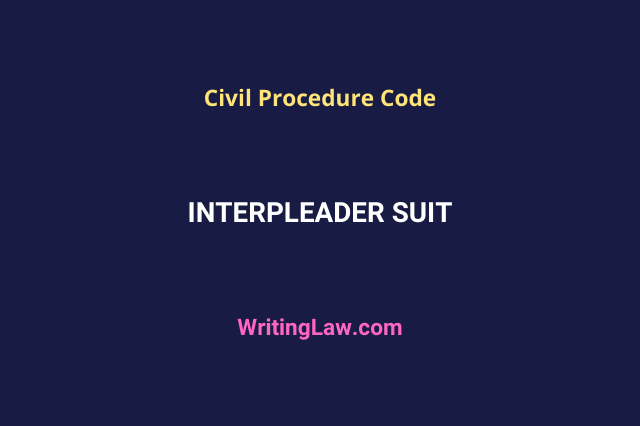
In an interpleader suit, the actual dispute isn’t between the plaintiff and the defendant but between the defendant who interpleads against each other. It is unlike an ordinary suit.
‘To interplead‘ means to litigate with each other to settle a point concerning a third party.
According to section 88 of the Civil Procedure Code, two or more persons claiming adversely to each other the same debt, sum of money, or other property (movable or immovable) from a person who does not claim any interest therein except the charges and costs incurred by him, and such person is ready to pay or deliver the same to the rightful claimant may file an interpleader suit.
For instance, X is in possession of some goods which is claimed by Y as well as Z. X does not hold any interest in the goods and is willing to deliver the goods to the rightful owner of the goods. X may institute an interpleader suit. Now, the court will decide the rightful owner between Y and Z.
Conditions for Instituting an Interpleader Suit
Following conditions must be satisfied before instituting an interpleader suit:
- There must be some debt sum of money or other property movable or immovable in dispute.
- There must be two or more persons claiming it against each other.
- The person from whom such money or property is being claimed must not be claiming an interest therein other than the charges and costs.
- Such a third person must be ready and willing to pay or deliver it to the rightful claimant.
- There must be no suit pending wherein the rights of the rival claimant can be properly adjudicated.
Who May Institute an Interpleader Suit?
In National Insurance Co. Ltd. vs Dhirendra Nath Banerjee And Anr (1937), it was observed that a person who has no interest in any debt, the sum of money or property except the charges or cost and such person is willingly ready to pay or deliver the property to the rightful claimant may file an interpleader suit.
Procedure for Interpleader Suit
The procedure to file an interpleader suit has been laid out in Order 35 of the Civil Procedure Code. The following additional facts must be stated in the plaint of an interpleader suit:
- The plaintiff claims no interest in the subject matter in dispute other than the charges and cost.
- The claims have been made by the defendants severally.
- There is no collusion between the plaintiff and any of the defendants.
At the first hearing, the court may declare the plaintiff discharged from all liability, award him the cost and dismiss him from the suit. And based on available evidence, the court may adjudicate the matter. In case of lack of evidence, the court may frame issues and try them by making one of the claimants, the plaintiff, in lieu of or in addition to the original plaintiff and shall proceed in the suit in an ordinary manner.
It was held in Jagganath vs Tulka Hera (1908) that a suit does not become an interpleader suit simply because the plaintiff requires the defendants to interplead with each other on one of the plaint’s prayers
The Person Who May Not Institute Interpleader Suit
According to Rule 5 of Order 35 of the Civil Procedure Code:
- An agent cannot sue his principal,
- A tenant cannot sue his landlord,
for the purpose of compelling them to interplead.
An exception to this general rule is that where the claim is made through the principal or landlord, the agent or tenant may file an interpleader suit against their principal or landlord, respectively.
Charge for Plaintiff’s Cost
The court may provide for the cost of the original plaintiff by giving him a charge on the things claimed or in some other effectual way.
Read Next:
1. Objection to Jurisdiction and Transfer of Suits
2. What Is Suit of Civil Nature in Civil Procedure Code
3. What Is Representative Suit as Per Civil Procedure Code
- What Is a Foreign Judgement and When It’s Not Binding in India - 26th July 2022
- What Are Second Appeals Under Civil Law - 23rd June 2022
- Civil Appeal as Per the Civil Procedure Code - 12th June 2022







